In 1965, Senator Daniel Patrick Moynihan Said the African American Family Was in Crisis Because of
Many Americans' introduction to United states of america history is the inflow of 102 passengers on the Mayflower in 1620. Only a year earlier, xx enslaved Africans were brought to the British colonies against their will.
As John Rolfe noted in a letter in 1619, "20 and odd negroes" were brought past a Dutch ship to the nascent British colonies, arriving at what is at present Fort Hampton, and then Point Comfort, in Virginia. Though enslaved Africans had been function of Portuguese, Spanish, French and British history across the Americas since the 16th century, the captives who landed in Virginia were probably the first slaves to arrive into what would become the United States 150 years later.
Iv hundred years on, the captives' arrival has informed about every major moment in American history, even if that history has been framed effectually anyone but Africans and African Americans.
"Historians, elected political figures [and] community leaders would prefer to sort of imagine the United States equally a kind of mythic, Anglo-Saxon Christian place," says Michael Guasco, an early American history professor at Davidson College.
In 1992, Toni Morrison told the Guardian: "In this country, American means white. Everybody else has to hyphenate."
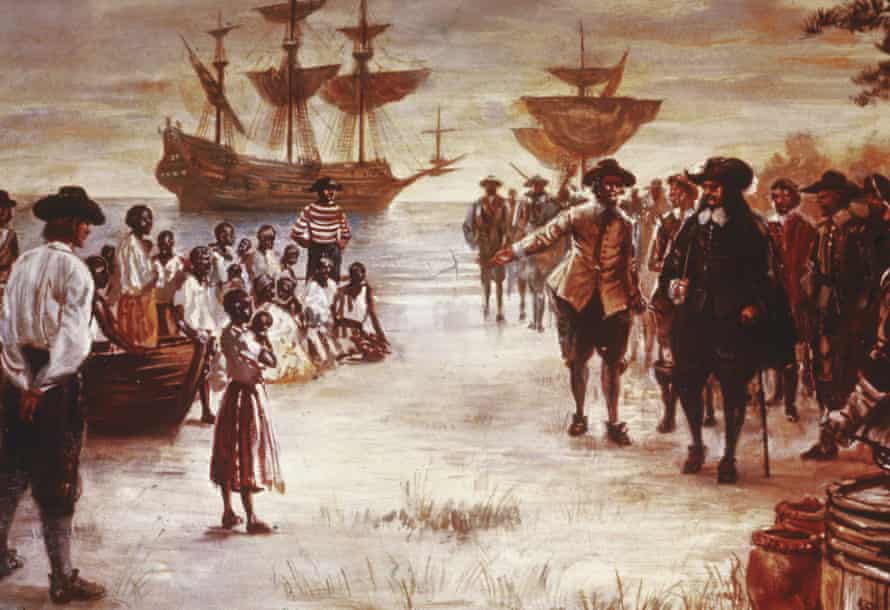
1619
Later the first captives were forced on to Virginia'south shores by a Dutchman in 1619, the majority of the country remained white and relied mainly on the labor of Native American slaves and white European indentured servants. Information technology was not until the stop of the 17th century that the transatlantic slave trade made its affect on the American colonies.
1661
The get-go anti-miscegenation statute – prohibiting wedlock betwixt races – was written into law in Maryland in 1661, shortly after enslaved people were brought to the colonies. By the 1960s, 21 states, nigh of them in the south, still had those laws in place. Alabama was the last land to repeal the ban on interracial marriage, in 2000.
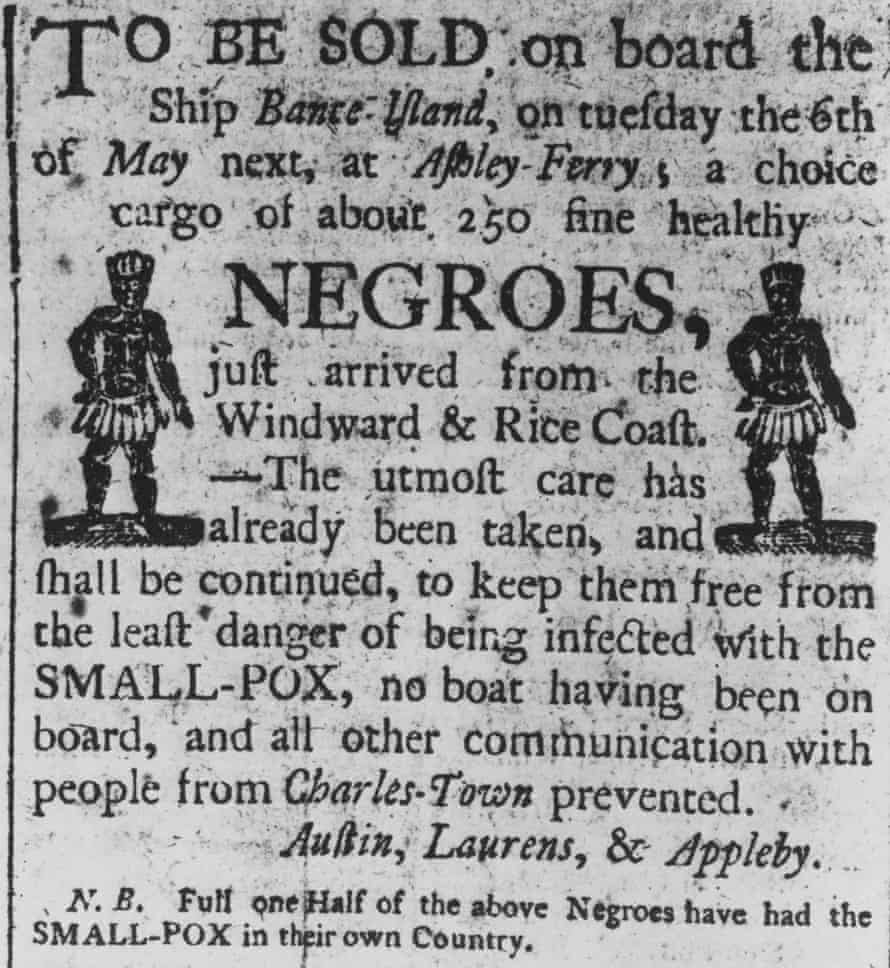
1776
The Proclamation of Independence, which embraced in its first lines "that all men are created equal, that they are endowed by their creator with certain unalienable rights", did not extend that right to slaves, Africans or African Americans, with the concluding version scrapping a reference to the denunciation of slavery. Thomas Jefferson, a slaveowner himself, penned those lines rejecting slavery; he removed the reference later on receiving criticism from a number of delegates who enslaved black people. This could stand for "the textile of the American political economic system" always since, some historians have said.
Slavery flourished initially in the tobacco fields of Virginia, Maryland and Northward Carolina. In the tobacco-producing areas of those states, slaves constituted more 50% of the population past 1776. Slavery and so spread to the rice plantations farther s. In South Carolina, African Americans remained a bulk into the 20th century, according to census data.
1860
The British-operated slave merchandise across the Atlantic was one of the biggest businesses of the 18th century. Approximately 600,000 of ten million African slaves made their way into the American colonies before the slave trade – non slavery – was banned past Congress in 1808. By 1860, though, the US recorded nearly four million enslaved black people – thirteen% of the population – in the country as the American-born population grew.
Viii of the first 12 US presidents were slave owners. Proponents of slavery supported the efforts of groups similar the American Colonization Club, who "sent back" tens of thousands of gratis black people – well-nigh of them American-born – to Liberia in the 19th century to foreclose disruption caused by free descendants of slaves.
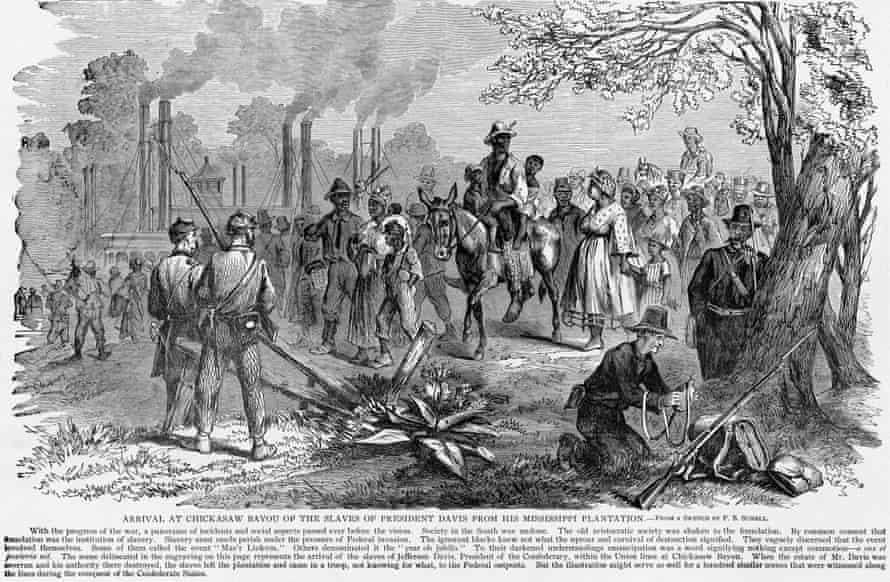
1865
Co-ordinate to Abraham Lincoln, the civil state of war was fought to keep America whole, and non for the abolition of slavery – at least initially. Southern states said they wanted to secede to protect states' rights, but they were really fighting to continue people enslaved. Lincoln took on the fight for the liberty of slaves, some historians have suggested, because he was worried the British would support the due south in its self-declared self-decision and recognize the s equally a separate entity. If he had made the war about ending slavery, it would have looked bad for the south's fight and the British supporting its cause. Lincoln's death was probably the starting time casualty of "a long civil rights movement that is not yet over", the historian Peter Kolchin has suggested.
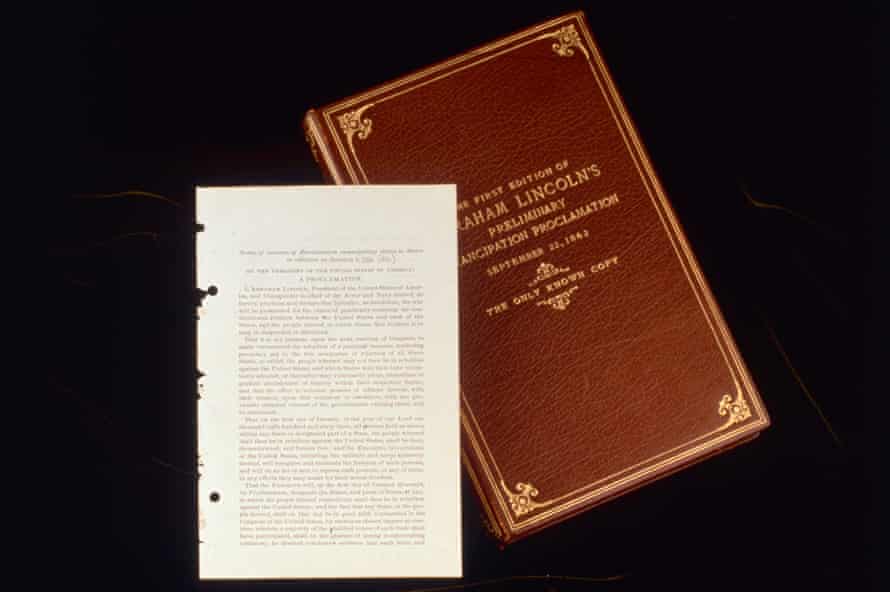
1868
Some experts have argued that Reconstruction laid the foundation for "the organization of new segregated institutions, white supremacist ideologies, legal rationalizations, actress-legal violence and everyday racial terror" – further widening the racial divide amidst blacks and whites. Others have pointed out that the end of the state of war left black Americans costless but their status "undetermined", with the passing of "codes" to forestall black people from being truly gratis.
But eventually, under the 14th amendment, African American men were granted the right to vote. Also, African Americans were extended birthright citizenship: that extends to descendants of freed blackness slaves and immigrants to present twenty-four hours.
1898
The recession of the late 19th century hitting the United states. Knight riders went out in the night, burning the homes of African Americans who bought their ain land. They rode upwards to Washington to demand change as southern white Democrats rolled back many of the admitting express freedoms from Reconstruction merely a couple of decades earlier.
The Jim Crow era of segregation forbade African Americans from drinking from the same water fountains, eating at the same restaurants or attending the same schools as white Americans – all lasting until, and sometimes well by, the 1960s.
1926
As African Americans were close out of jobs and opportunities during Jim Crow, and as more jobs became available in the north and midwest, more 2 one thousand thousand southern African Americans migrated later on the kickoff world war. Notwithstanding, even hundreds of miles away from southern segregation, these migrating Americans were met by "sundown towns", where black people were non welcome subsequently sunset, and past restrictions on where they could live in cities.
Oregon's constitution, for example, only removed its exclusionary clause, prohibiting black people to enter the state, in 1926.
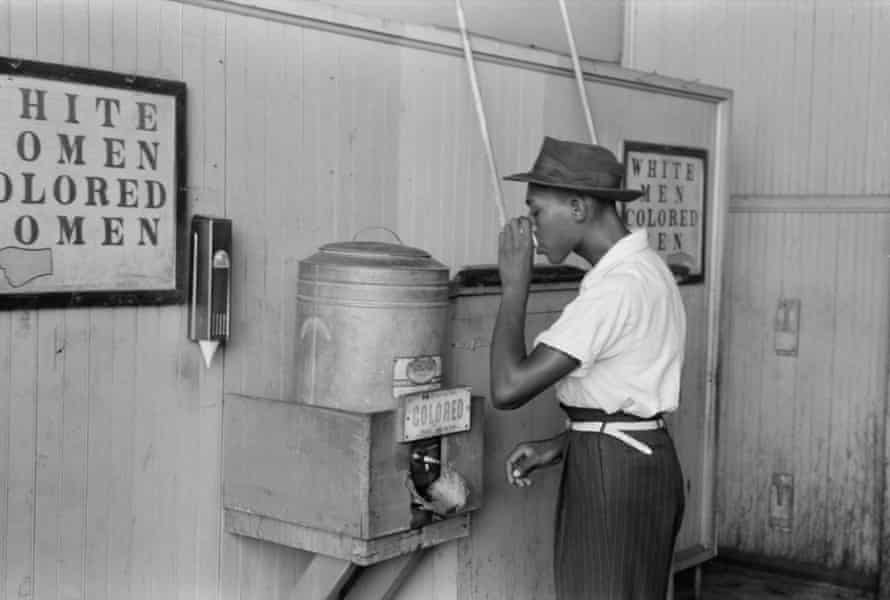
1954
In the lead-up to the end of Jim Crow and the civil rights era, the fight continued. For example: only in 1948 did the United states of america military desegregate, by executive order. In 1954, in the Brown v Board of Education ruling, the supreme court ruled that segregation was unconstitutional and schools would have to integrate. Civil rights leaders led anti-segregation marches across the land in the 1960s. In 1964, President Lyndon Johnson signed the Civil Rights Act into law. Bussing African American children to white schools in white neighborhoods was deemed constitutional.
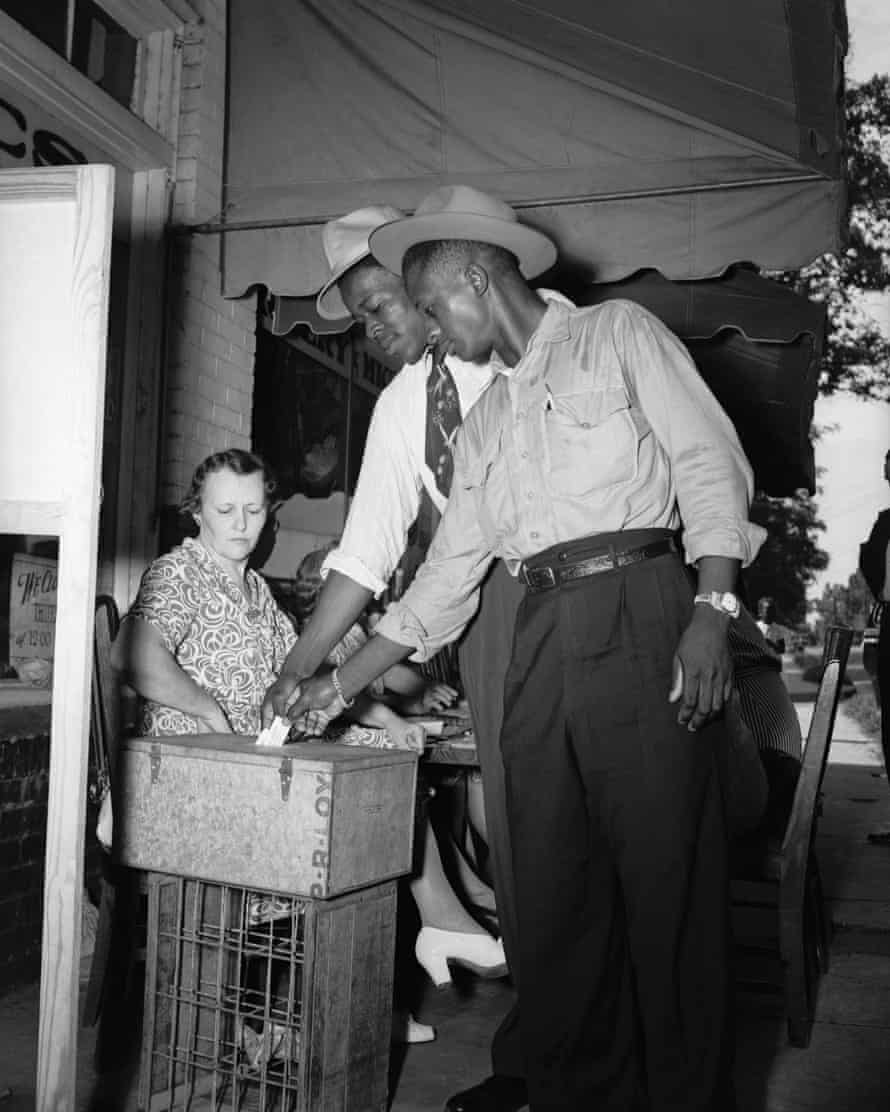
1965
"Slavery was gone just Jim Crow was alive. Near all southern African Americans were shut out of the ballot box and the political power it could yield," wrote Edward E Baptist in The Half Has Never Been Told: Slavery and the Making of American Capitalism. The Voting Rights Human action of 1965 attempted to correct this, prohibiting racial discrimination in voting and placing restrictions on a number of southern states if they tried to change voting rights laws. Those restrictions were recently overturned in a 2013 supreme courtroom ruling.
Since the publication, in 2014, of The Case for Reparations, by Ta-Nehisi Coates, the subject area of how to settle the financial debts of 250 years of slavery has risen up the political agenda. Those arguing for a financial settlement to descendants of slaves say it is designed to address the racial inequality that even so lingers in the U.s..
A Pew study in 2017 showed that the median wealth of white households was $171,000 – 10 times that of black households ($17,100). The Democratic presidential hopeful Cory Booker has introduced a Senate nib on reparations and has been supported past Elizabeth Warren and Bernie Sanders.
Meanwhile, voter suppression, another legacy of slavery and its aftermath, is also condign a more visible upshot. Aggressive attempts past mostly ex-Confederate states to limit the vote for poorer communities of color has go more pronounced since the gutting of the Voting Rights Act in 2013.
As Carole Anderson, academic and the author of One Person, No Vote wrote in the Guardian last week, about the 33 meg Americans who have been purged from the voter rolls since 2014: "Not surprisingly, these massive removals are full-bodied in precincts that tend to have higher minority populations and vote Autonomous."
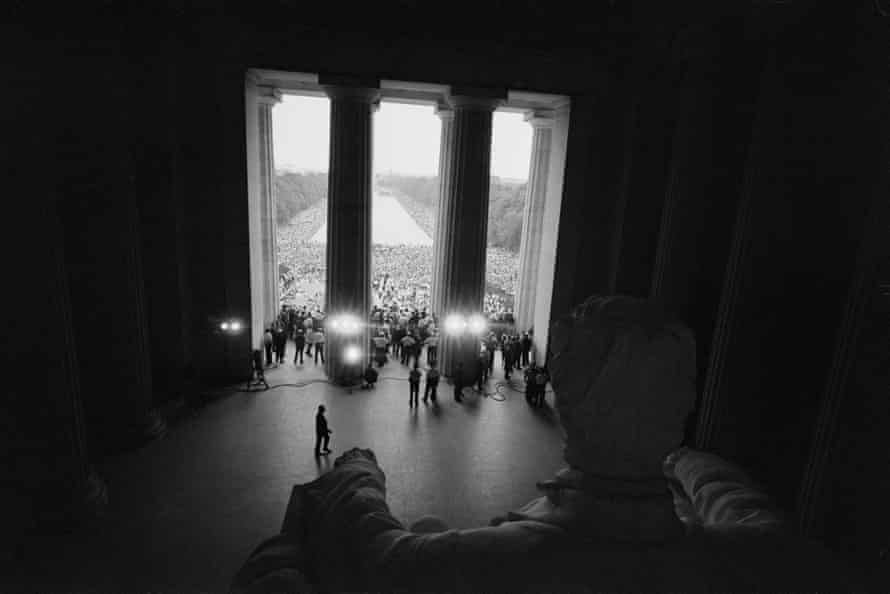
-
This article drew on a number of books about the American history of slavery, including The Half Has Never Been Told: Slavery and the Making of American Commercialism past Edward East Baptist; American Slavery, 1619-1877 past Peter Kolchin; and Black Is a Country: Race and the Unfinished Struggle for Democracy by Nikil Pal Singh. It also used census data available online at demography.gov.
-
This commodity was amended on 24 June 2021. A Pew study in 2017 showed that the median wealth of white households was $171,000, rather than the median income as an before version said. It was farther amended on 25 February 2022 to add together the 1860 enslaved population in Delaware and to reflect the right Virginia borders in that year.
Source: https://www.theguardian.com/news/2019/aug/15/400-years-since-slavery-timeline
0 Response to "In 1965, Senator Daniel Patrick Moynihan Said the African American Family Was in Crisis Because of"
Post a Comment